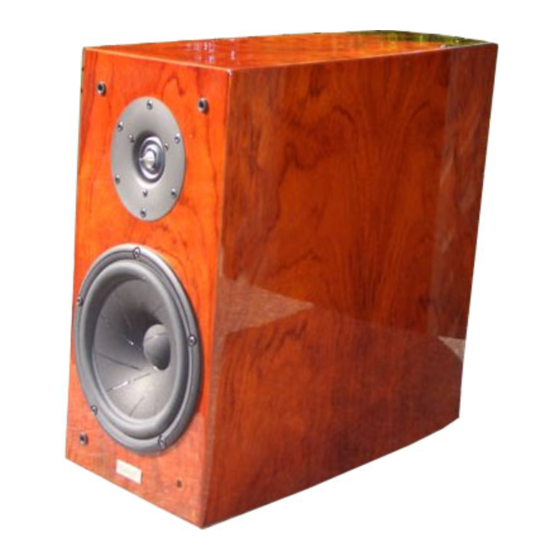
Bringing them to life
Running in
WHY RUNNING IN?
In the first hours of operation the characteristics of the materials
used in your loudspeakers will change dramatically, so actually
when you get your speakers they are off spec!
A run in period therefore is essential before you evaluate
the performance of your speakers.
Letting your speakers operate at high level with a full spectrum
input will get them within specifications in app. 12 hours time.
(See instructions on how to do this later in this section).
Full performance of your speakers will happen after app. 2-400
Hours of use depending on the power level you drive them with.
Also time/aging is of importance as the materials used will change
over time.
Under normal circumstances full performance will be met after
app. 6-12 months of aging where the final condition of the
materials used will be met.
After this period they will continue to perform optimally for
decades, assuming the speakers are not abused or overloaded.
Run-in Instruction:
To not disturb you neighbours or other sensitive creatures you
can do the following:
• Connect the speakers in opposing phase.
(one speaker being connected with the positive output
from the amp going to the negative input and the
negative output going to the positive input, while the
other speaker is connected correctly + to + and - to -)
• Move them close together, facing each other
(head to head).This will assure the bass output is
almost eliminated!
• Use a piece of music with a broad spectrum of energy.
(lows & mids & higs) Special recordings for this purpose
are available through hi-fi magazines or record shops
specializing in specialty recordings etc...
• Turn up the volume until normal to high setting, while
watching the excursion of the bass drivers & making
sure the speakers are not overloaded.
• Leave the speakers like this for half a day or more
(while at work...) and you will have a set of speakers
ready to enjoy when you come home at night.
During the next period of time the speakers will improve further
while being used.
In the next 6-12 moths the material used in the drive units and
the cabinet will go through an aging process that basically never
stops, but the materials will be close to their final specification
after app. 12 months of aging, so there will be lot of good things
coming worth waiting for!
How to drive them
Caution on choosing and using
the electronic equipment:
Choosing your amp:
Loudspeakers are current driven devices, so under
normal circumstances you should choose and get the best per-
formance from amplifiers with high current capability.
To give you the performance we designed the GamuT speakers
to have, you will need a power amp with frequency linear and
low output impedance, which normally means using well designed
high power solid state amps.
We have used the GamuT D200MKIII & M200MKIII in
combination with the D3 Pre-amp during the design process of
the L speakers. Using the D200 MKIII/M200MKII & the D3 amps
in combination with the L Speakers will give you the ultimate
GamuT sound experience.
Some high quality valve amps will probably be capable of driving
the GamuT speakers with excellent performance, but we will
leave that for you to find out.
Using your amp:
Loudspeakers are rarely damaged by high-power signals, but by
clipped signals.
Therefore, it is always preferable to use a large and powerful
amplifier with lots of headroom rather than a small amplifier,
which will start distorting at much lower output levels.
A distorted signal will multiply the input to your high frequency
section and cause damage to your high frequency drive unit and
high frequency crossover network, so never play your loudspeak-
er at higher levels than where the sound is clear and undistorted.
The D200 MK II & M200 MK III has all the power you need to
drive the L speakers to their optimum
Location, location!
Why is location critical?
Placing your speakers correctly in your listening room is
extremely essential to get the optimum sound experience.
Main reason is that the listening room is an acoustic resonator
and reflector, and these resonances and reflections (off the
walls/floors and ceiling), vastly influences your listening
experience.
By positioning your speaker correctly relative to the boundaries
of the room assures you a listening "window" where you will
receive as much undisturbed sound as possible, thereby allowing
your hearing to sort out the good signals from the distorted
reflected signals.
Minimum recommendations for positioning:
• Please note:The minimum distance between the speakers and
the minimum listening distance is the same.
7
